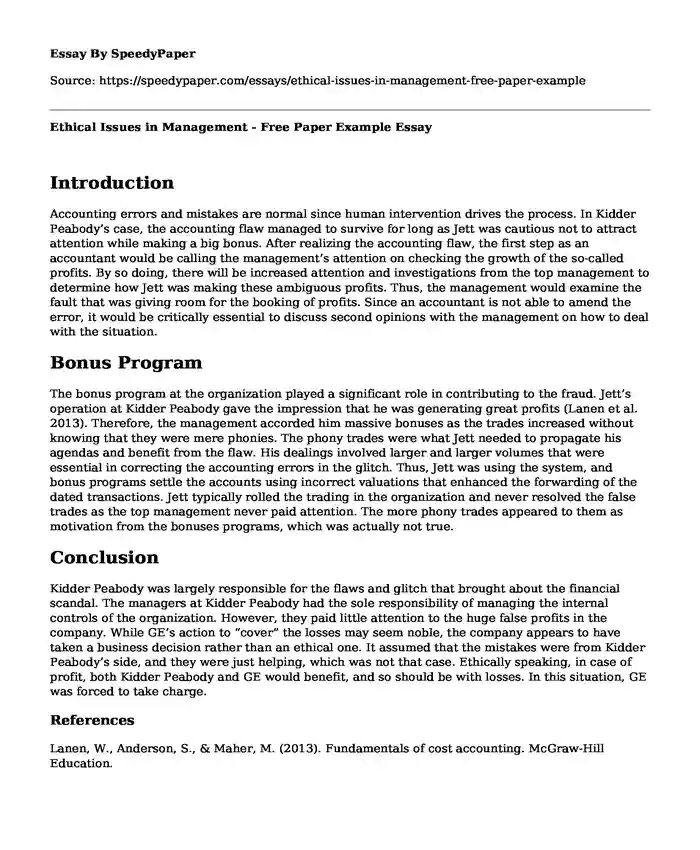
| Type of paper: | Essay |
| Categories: | Management Ethics Accounting |
| Pages: | 2 |
| Wordcount: | 425 words |
Introduction
Accounting errors and mistakes are normal since human intervention drives the process. In Kidder Peabody’s case, the accounting flaw managed to survive for long as Jett was cautious not to attract attention while making a big bonus. After realizing the accounting flaw, the first step as an accountant would be calling the management’s attention on checking the growth of the so-called profits. By so doing, there will be increased attention and investigations from the top management to determine how Jett was making these ambiguous profits. Thus, the management would examine the fault that was giving room for the booking of profits. Since an accountant is not able to amend the error, it would be critically essential to discuss second opinions with the management on how to deal with the situation.
Bonus Program
The bonus program at the organization played a significant role in contributing to the fraud. Jett’s operation at Kidder Peabody gave the impression that he was generating great profits (Lanen et al. 2013). Therefore, the management accorded him massive bonuses as the trades increased without knowing that they were mere phonies. The phony trades were what Jett needed to propagate his agendas and benefit from the flaw. His dealings involved larger and larger volumes that were essential in correcting the accounting errors in the glitch. Thus, Jett was using the system, and bonus programs settle the accounts using incorrect valuations that enhanced the forwarding of the dated transactions. Jett typically rolled the trading in the organization and never resolved the false trades as the top management never paid attention. The more phony trades appeared to them as motivation from the bonuses programs, which was actually not true.
Conclusion
Kidder Peabody was largely responsible for the flaws and glitch that brought about the financial scandal. The managers at Kidder Peabody had the sole responsibility of managing the internal controls of the organization. However, they paid little attention to the huge false profits in the company. While GE’s action to “cover” the losses may seem noble, the company appears to have taken a business decision rather than an ethical one. It assumed that the mistakes were from Kidder Peabody’s side, and they were just helping, which was not that case. Ethically speaking, in case of profit, both Kidder Peabody and GE would benefit, and so should be with losses. In this situation, GE was forced to take charge.
References
Lanen, W., Anderson, S., & Maher, M. (2013). Fundamentals of cost accounting. McGraw-Hill Education.
Cite this page
Ethical Issues in Management - Free Paper Example. (2023, Dec 12). Retrieved from https://speedypaper.net/essays/ethical-issues-in-management-free-paper-example
Request Removal
If you are the original author of this essay and no longer wish to have it published on the SpeedyPaper website, please click below to request its removal:
- Financial Reporting - Lease Accounting. Free Essay Example.
- Comparison Essay Sample: Bookkeeping versus Accounting
- Ethical Issues with an Aging Population, Essay Example
- Free Essay: Who Is Watching? Thinking Ethically About Observing Children
- Free Essay on Application and Use of Stakeholder Management Approach
- The Bullwhip Effect: A Supply Chain Nightmare! - Essay Sample
- Free Essay Example - Princeton University
Popular categories




